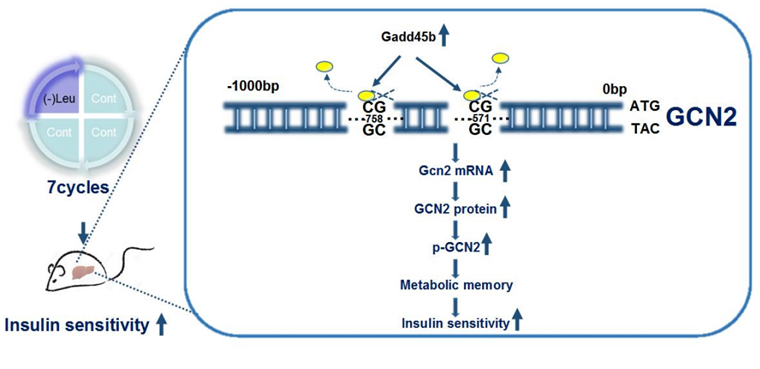Intermittent Leucine Deprivation Produces Long-Lasting Improvement in Insulin Sensitivity
The incidence of type 2 diabetes in China has exceeded 100 million at present. The pathological feature of type 2 diabetes is insulin resistance, which, if not controlled in time, will cause a variety of serious complications, including atherosclerosis, neuropathy, retinopathy and so on. Therefore It is urgent to elucidate its pathogenesis and explore effective intervention methods.
In a study published on Diabetes on November 5th of 2021, researchers of Dr. GUO Feifan’s group from the Shanghai Institute of Nutrition and Health (SINH) of the Chinese Academy of Sciences (CAS) found a new dietary pattern – intermittent leucine deprivation diet could improve insulin sensitivity in the long term by forming the metabolic memory in liver in an epigenetic pattern.
In addition to hereditary factor, environmental factors, especially nutrition, are closely related to the development of insulin resistance. Amino acids are widely known as the basic materials of protein, but recently more and more studies have found that they are also important signal molecules, which can regulate many key signaling pathways in life processes and affect many important physiological activities.
Cohort studies have found the positive correlation between the incidence of obesity and diabetes and the levels of essential amino acids such as branched amino acids. The previous work of Dr. GUO's group also found the above correlation in a Shanghai population study. They especially discovered that removing an essential amino acid leucine from the diet can significantly enhance insulin sensitivity, and elucidated a series of mechanisms.
These researches provide important theoretical basis and novel ideas for understanding the pathogenesis and intervention strategies of diabetes. However, whether the improvement effect of leucine deprivation on insulin resistance can be maintained for long term and the related mechanisms remain unclear. Based on this, Dr. GUO's group developed a novel amino acid (intermittent leucine deprivation) intervention pattern that can improve insulin sensitivity in the long term.
Researchers found that a short-term (one day) leucine deprivation improved the insulin sensitivity in mice for up to three days. Inspired by the beneficial effects of intermittent fasting on metabolism, researchers gave mice intermittent leucine deprivation diet for further study. They found that seven cycles of intermittent leucine deprivation (one cycle=one day leucine deprivation+ three days of control diet), enhanced insulin sensitivity on mice at least nearly three months even return to normal diet, by forming metabolic memory.
More importantly, intermittent leucine treatment also significantly improved insulin sensitivity in different insulin resistance models. Further studies showed that the beneficial effects of intermittent leucine deprivation depended on the increase of hepatic GCN2 expression. The expression of GCN2 relied on the up-regulation of the demethylase Gadd45b to affect the CpG sites of its promoter and then regulate the methylation level of GCN2.
In conclusion, this study found that intermittent leucine deprivation can improve insulin sensitivity in the long term in an epigenetic manner. In addition, this work also provides important evidence of the formation of the liver metabolic memory and the regulation of amino acid deficient sensor GCN2 at the epigenetic level. The study provides an important theoretical basis for understanding the pathogenesis and treatment of diabetes, and also provides a new idea for nutrition intervention of diabetes.
Prof. GUO Feifan from SINH of CAS, Prof. LI Yiming from Huashan Hospital of Fudan University, and Prof. HU Cheng from Shanghai Jiao Tong University Affiliated Sixth People's Hospital are the corresponding authors of this paper. YIN Hanrui, PhD at SINH of CAS is the first author of the paper. This research was funded by the National Key R&D Program of China, the National Natural Science Foundation of China, Shanghai Leading Talent Program, and Novo Nordisk-Chinese Academy of Sciences Research Fund.

Intermittent leucine deprivation produces long-lasting improvement in insulin sensitivity by regulating hepatic Gadd45b/Gcn2 signals. (Image provided by Dr. GUO Feifan's group)
Media Contact:
WANG Jin (Ms.)
Shanghai Institute of Nutrition and Health,
Chinese Academy of Sciences
Email: sibssc@sibs.ac.cn
Web: http://english.sinh.cas.cn/
